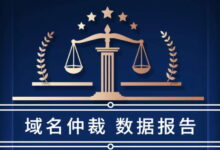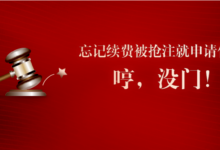【案情介绍】
投诉人来自美国亚利桑那州,为一个体经营者,声称自己经营一家专营足球运动服饰及相关产品的商场,于2000年10月10日开始将“SOCCER MALL”作为商标使用,之后于2014年向美国专利商标局提出商标申请,最后于2016年6月28日正式核准注册。
投诉人指控称:自开始启用该商标以来,其通过长期持续使用并申请注册,获得了受法律保护的商标权,被投诉人注册的争议域名跟其商标完全相同,且解析网站后没有进行善意使用,而是设置各种链接,并对外公开出价转让,构成恶意注册及使用。
被投诉人未提交答辩意见。被投诉人来自中国,相关信息通过注册商采取了隐私保护。争议域名注册时间为2000年8月10日,也即比投诉人正式使用商标的时间早2个月时间。
【专家组裁决】
专家组审查认为:投诉人首次使用商标的时间是2000年10月10日,相比较争议域名注册时间晚了2个月,而正式申请商标注册及核准注册的时间更是晚了好几年,据此难以认定被投诉人在当时注册域名的时候具有恶意,最终裁决驳回投诉人请求,争议域名继续由被投诉人持有。
为阐述这个观点,专家引用了多份在先案例,并援引《世界知识产权组织专家意见综述》(第二版,2011/2013)指出:尽管在UDRP程序中,投诉获得支持的第一项要件所需要的商标权并没有注册时间的限制,但当争议域名注册时间早于投诉人商标注册时间时,则难以认定域名注册具有恶意,因为域名持有人在注册域名时难以预料投诉人在后尚未存在的商标权(原文:[A]lthough a trademark can form a basis for a UDRP action under the first element irrespective of its date …, when a domain name is registered by the respondent before the complainant’s relied-upon trademark right is shown to have been first established (whether on a registered or unregistered basis), the registration of the domain name would not have been in bad faith because the registrant could not have contemplated the complainant’s then non-existent right.)。
【高锖律师点评】在UDRP程序中,一项投诉要获得支持,需要同时满足三个要件,第一个要件是判断投诉人商标或商业标识与争议域名是否相同或构成混淆性近似;第二个要件是判断被投诉人对争议域名是否享有权利及合法利益;第三个要件是判断被投诉人对争议域名的注册及使用是否具有恶意,注意第三个要件中的恶意需要同时体现在注册及使用过程中。本案专家组裁决并没有按照常规的审查顺序逐项进行,而是直接审查第三项,即恶意的问题,并明确指出域名先于商标注册,不存在注册的恶意,故第三项要件不满足,其他两项要件就无需审查,最后就直接作出驳回投诉人请求裁定。
显然,专家组在该案件中审查逻辑明显区别于曾一时引起热议的微信域名案,两案裁决的个中理由及背后的法律文化值得研究。
附:裁决书
DECISION
Hassan Shams v. Private Registration / WhoisGuardService.com
Claim Number: FA1608001689685
PARTIES
Complainant is Hassan Shams (“Complainant”), represented by Shawn Diedtrich of Prudens Law LLC, Arizona, USA. Respondent is Private Registration / WhoisGuardService.com (“Respondent”), China.
REGISTRAR AND DISPUTED DOMAIN NAME
The domain name at issue is
PANEL
The undersigned certifies that he has acted independently and impartially, and, to the best of his knowledge, has no conflict of interests in serving as Panelist in this proceeding.
Terry F. Peppard as Panelist.
PROCEDURAL HISTORY
Complainant submitted a Complaint to the Forum electronically on August 17, 2016; the Forum received payment on August 17, 2016.
On August 23, 2016, Nanjing Imperiosus Technology Co. Ltd. confirmed by e-mail to the Forum that the
On August 25, 2016, the Forum served the Complaint and all Annexes, including a Written Notice of the Complaint, setting a deadline of September 14, 2016 by which Respondent could file a Response to the Complaint, via e-mail to all entities and persons listed on Respondent’s registration as technical, administrative, and billing contacts, and to postmaster@soccermall.com. Also on August 25, 2016, the Written Notice of the Complaint, notifying Respondent of the e-mail addresses served and the deadline for a Response, was transmitted to Respondent via post and fax, to all entities and persons listed on Respondent’s registration as technical, administrative and billing contacts.
Having received no response from Respondent, the Forum transmitted to the parties a Notification of Respondent Default.
On September 26, 2016, pursuant to Complainant’s request to have the dispute decided by a single-member Panel, the Forum appointed Terry F. Peppard as sole Panelist in this proceeding.
Having reviewed the communications records, the Administrative Panel (the “Panel”) finds that the Forum has discharged its responsibility under Paragraph 2(a) of the Rules for Uniform Domain Name Dispute Resolution Policy (the “Rules”) “to employ reasonably available means calculated to achieve actual notice to Respondent” through submission of Electronic and Written Notices, as defined in Rule 1 and Rule 2. Therefore, the Panel may issue its decision based on the documents submitted and in accordance with the ICANN Policy, ICANN Rules, the Forum’s Supplemental Rules and any rules and principles of law that the Panel deems applicable, without the benefit of any response from Respondent.
RELIEF SOUGHT
Complainant requests that the domain name be transferred from Respondent to Complainant.
PARTIES’ CONTENTIONS
A. Complainant
Complainant is an individual located in Phoenix, Arizona, USA, who owns a retail
business called SOCCER MALL.
Complainant owns and has continuously used the mark SOCCER MALL from the date of its first use in commerce on October 10, 2000, in connection with the marketing of retail and online store services, including selling soccer uniforms, footwear, socks, shin-guards, jerseys, gloves, pants, shorts, knee protectors, t-shirts, sweatshirts, sweat pants, soccer balls, backpacks, travel bags, duffel bags, baseball hats, caps, equipment accessories and related sporting goods and sportswear.
Complainant’s long and continuous use of the mark in commerce and its extensive efforts to market its goods and services under the SOCCER MALL mark have created in it common law trademark rights in the mark.
Complainant holds a registration for the SOCCER MALL service mark, which is on file with the United States Patent and Trademark Office (“USPTO”) (Registry No. 4,986,219, filed September 16, 2014, registered June 28, 2016).
Respondent registered the
The domain name is confusingly similar to Complainant’s SOCCER MALL mark.
Respondent has not been commonly known by the domain name.
Complainant has not granted to Respondent permission to use its SOCCER MALL mark in the domain name.
Respondent has not made any bona fide offering of goods or services or any legitimate noncommercial or fair use of the domain name.
The domain name resolves to a website featuring multiple links that divert Internet users to other parked websites.
Respondent has caused these links to resolve to other websites which operate in competition with the business of Complainant.
Respondent presumably gains monetarily from the operation of such links.
Respondent has no rights to or legitimate interests in the domain name.
Respondent has made a general offer of the domain name for sale at several of the resolving webpages for a price in excess of its costs of acquisition of the domain name.
Respondent has registered and uses the domain name in bad faith.
B. Respondent
Respondent failed to submit a Response in this proceeding.
SUPPORTED LANGUAGE REQUEST
Complainant requests, pursuant to UDRP Rule 11(a), that the language of this proceeding be English. Complainant makes this request in light of the Chinese language Registration Agreement. In order to ensure fairness and justice to both parties, it is established practice to take UDRP Rules 10(b) and (c) into consideration in determining the language of the proceeding. Factors that panels have found persuasive include: (i) WHOIS information placing Respondent in a country whose identity suggests a familiarity with the English language, and (ii) the filing of a domain name registration which evinces an understanding of the English language. See, for example, The Argento Wine Company Limited v. Argento Beijing Trading Company, D2009-0610 (WIPO July 1, 2009) (the panel there exercising discretion in deciding that the language of the proceeding be English, contrary to the Registration Agreement, based on evidence that respondent had command of English).
The Panel may also weigh the cost in terms of both time and economic expense which would be incurred in enforcing the Chinese language agreement, to the extent that it might result in prejudice to either party. See Finter Bank Zurich v. Shumin Peng, D2006-0432 (WIPO June 12, 2006) (deciding that the proceeding should be in English, and reciting that: “It is important that the language finally decided by the Panel for the proceeding is not prejudicial to either one of the parties in his or her ability to articulate the arguments for the case.”).
Complainant makes the following contentions in support of its request:
i. The
ii. All websites to which the domain name resolves are in English.
iii. The offers of the domain name for sale are made in English, and the
domain name sales sites are in English.
iv. The domain name parking sites used by Respondent are in English.
v. The items for sale on the websites are in English.
vi. The term “soccer” that is used to refer to the sport on all the websites, is
a term used primarily in English-speaking countries, and Chinese
speakers do not translate the term “soccer” into Chinese, but translate
the term “football” or a similar term into Chinese to describe the sport.
vii. Complainant is a small business operator in the United States.
viii. Respondent has chosen to conceal its identity through a Private
Registration service.
In light of these considerations, and further considering that Respondent has not responded to the Complaint, we conclude, pursuant to UDRP Rule 11(a), that sufficient evidence has been presented by Complainant to justify permitting this proceeding to be conducted in the English language. Accordingly, all aspects of this proceeding shall be conducted in English.
FINDINGS
Complainant has failed to show that the contested domain name was registered in bad faith.
DISCUSSION
Paragraph 15(a) of the Rules instructs this Panel to “decide a complaint on the basis of the statements and documents submitted in accordance with the Policy, these Rules and any rules and principles of law that it deems applicable.”
Paragraph 4(a) of the Policy requires that Complainant must prove each of the following three elements to obtain an order that a domain name should be cancelled or transferred:
(1) the domain name registered by Respondent is identical or confusingly similar to a trademark or service mark in which Complainant has rights; and
(2) Respondent has no rights or legitimate interests in respect of the domain name; and
(3) the domain name has been registered and is being used in bad faith.
In view of Respondent’s failure to submit a response, the Panel will, pursuant to paragraphs 5(f), 14(a) and 15(a) of the Rules, decide this proceeding on the basis of Complainant’s undisputed representations, and, pursuant to paragraph 14(b) of the Rules, draw such inferences as it deems appropriate. The Panel is entitled to accept all reasonable allegations and inferences set out in the Complaint as true unless the evidence is clearly contradictory. See Vertical Solutions Mgmt., Inc. v. webnet-marketing, inc., FA 95095 (Forum July 31, 2000) (finding that a respondent’s failure to respond allows all reasonable inferences of fact in the allegations of a UDRP complaint to be deemed true). See also Talk City, Inc. v. Robertson, D2000-0009 (WIPO Feb. 29, 2000): “In the absence of a response, it is appropriate to accept as true all allegations of the Complaint.”
Registration and Use in Bad Faith
While Respondent makes no contentions with regard to the application of Policy ¶ 4(a)(iii) to the facts set out in the Complaint filed in this proceeding, we are obliged to take note of the fact that the record shows the date on which Complainant first used the SOCCER MALL mark in commerce was October 10, 2000. This is two (2) months after Respondent’s August 10, 2000, registration of the
[T]here was no bad faith on the part of Respondent when registering the subject domain name.
This is because:
[A]lthough a trademark can form a basis for a UDRP action under the first element irrespective of its date …, when a domain name is registered by the respondent before the complainant’s relied-upon trademark right is shown to have been first established (whether on a registered or unregistered basis), the registration of the domain name would not have been in bad faith because the registrant could not have contemplated the complainant’s then non-existent right.
“WIPO Overview of WIPO [World Intellectual Property Organization] Panel Views on Selected UDRP Questions,” Second Edition (2011/2013).
Accord: John Ode dba ODE and ODE – Optimum Digital Enterprises v. Intership Limited, WIPO Case No. D2001-0074; Collective Media, Inc. v. CKV / COLLECTIVEMEDIA.COM, WIPO Case No. D2008-0641; and Meeza QSTP-LLC v. Torsten Frank / medisite Systemhaus GmbH, WIPO Case No. D2009-0943.
We therefore find that Complainant has failed to show that Respondent registered the contested
Because of this conclusion, and because Complainant cannot prevail in this proceeding unless it proves each of the three elements of Policy ¶ 4(a), it is unnecessary for us to inquire into the question of confusing similarity of the domain name with Complainant’s mark under Policy ¶ 4(a)(i) or the issue of the existence of Respondent’s rights to or legitimate interests in the domain name under Policy ¶ 4(a)(ii). See Creative Curb v. Edgetec Int’l Pty. Ltd., FA 116765 (Forum Sept. 20, 2002) (finding that, because a UDRP complainant must prove all three elements under the Policy, a complainant’s failure to prove any one of those elements makes inquiry into the remaining two unnecessary). See also Hugo Daniel Barbaca Bejinha v. Whois Guard Protected, FA 836538 (Forum Dec. 28, 2006) (deciding not to inquire into assertions of a respondent’s rights to or legitimate interests in a domain name or its registration and use of the domain name in bad faith where a UDRP complainant could not satisfy the requirements of Policy ¶ 4(a)(i)).
DECISION
Complainant having failed to establish one of the elements required to be proven under the ICANN Policy, the Panel concludes that the relief requested must be, and it is hereby, DENIED.
Accordingly, it is Ordered that challenged the
Terry F. Peppard, Panelist
Dated: October 5, 2016
 米米地域名
米米地域名







最新评论
聚名网,就是一个垃圾,里面什么都说公司规定,其实都是他们自己说了算,我也被他们骗过,代理商就是拉人头的。
主要他们还偷税漏税,不给开发票,今天我110转网警立案,不知道可不可以追回来我的钱。这样的公司怎么不倒闭呢?,110网警或者工商税务投诉
都是利益在作祟,可这么大的平台,你得讲职业道德啊。
HiDomains.com 你好,域名!
非常好的建议,正在学习中!
虽然是2012年的但是还是有价值
Great guide
不错